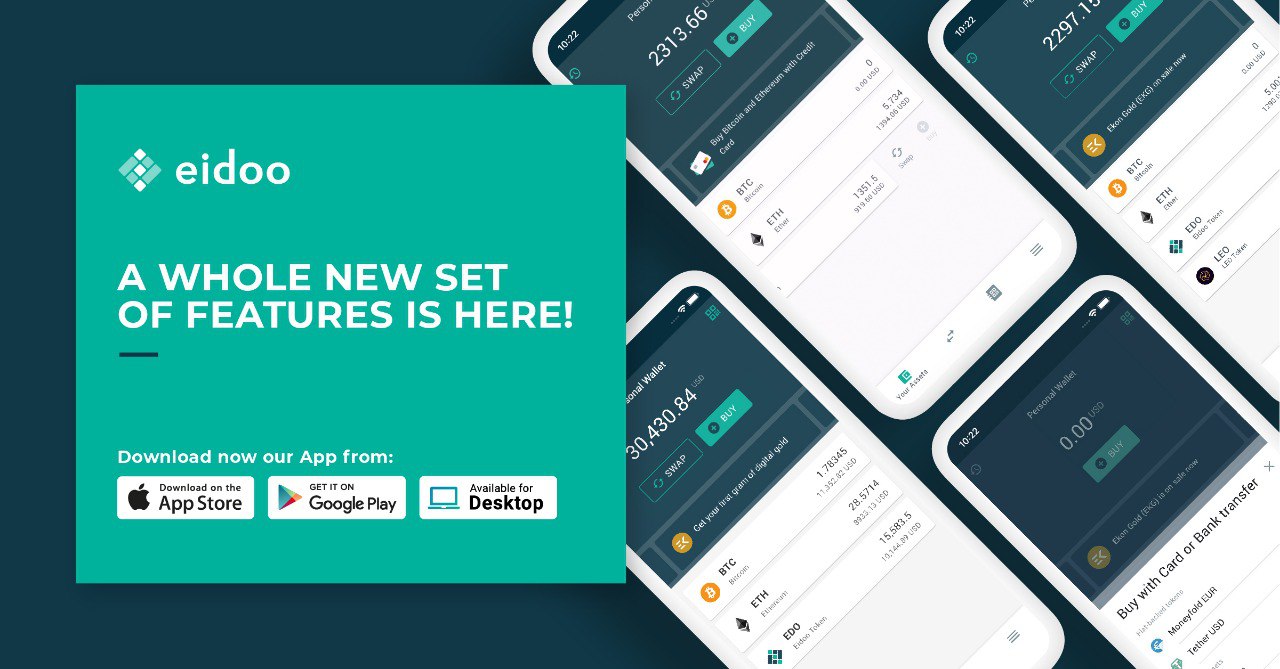Just a few days ago the Eidoo project, born in 2017 as a mobile wallet for Ethereum and ERC20 tokens, integrated support for another blockchain, that of Litecoin. So far, the Eidoo wallet supports Ethereum, ERC20 tokens, Bitcoin and Litecoin. However, one of the most interesting aspects of the app is definitely the hybrid exchange integrated into the platform.
The app, in fact, features a special section where there is a full-fledged exchange that allows trading Ethereum, ERC20 tokens and also the Tether (USDT) stablecoin.
The particularity of this exchange is that it is a hybrid solution, halfway between a DEX and a centralised exchange.
How does the Eidoo Hybrid Exchange work?
As mentioned above, the Eidoo exchange does not use the classic centralised exchange model, but neither does it use a fully decentralised system, as is the case with EtherDelta, CobinHood and IDEX.
The solution operates in a hybrid way, guaranteeing maximum security, very low fees, complete control and reliability for the user. In this way, it is possible to take advantage of the Ethereum blockchain (decentralisation) for access, transactions and token transfers.
The centralised part, on the other hand, deals with the management of orders, so as to keep commission costs as low as possible and guarantee good performance of the infrastructure.
To do this, each active exchange account has its own smart contract, which allows the user to trade Ethereum for ERC20 tokens or vice versa.
The smart contract also prevents unauthorised access by other identities, making it virtually impossible to steal funds from users.
As a result, logging in works in the same way as in a classic DEX, where each user has their own smart contract or onchain address, to which only the users themselves can access.
Then there is a dedicated system – supported by the Oraclize verification system – that handles the orders off-chain.
As soon as the orders are executed, they will be notified to the Smart Contracts of the users, who will send the final operation to the blockchain.
This allows to drastically reduce commission costs and achieve excellent performance on the platform while maintaining a high level of security. The critical part of an exchange, in fact, concerns the management of funds, which on classic exchanges are entirely controlled and held by the platform, whereas on DEXs, funds stay with the users.
Where to download Eidoo and how to use it
To access the hybrid exchange it is necessary to install the Eidoo app and create – in case the user does not already have one – a wallet and backup the corresponding SEED backup.
The app is available for iOS, Android and desktop devices. Once the wallet is correctly configured, it is possible to access the hybrid exchange by clicking on the icon with the two arrows, located in the central part of the bar at the bottom of the screen.
For the first access to the hybrid exchange, it is necessary to enable the trading section by carrying out a transaction in order to activate the smart contract.
The transaction involves the classic cost of a transaction on the Ethereum network. It will only be used to create the Smart Contract associated with the user’s account.
After that, it is possible to access the hybrid exchange dashboard and the trading wallet.
Eidoo, in fact, has decided to keep the wallet dedicated to trading separate from the classic one of the app, so as to allow simpler and more intuitive management of funds. Obviously, it is also possible to withdraw funds from the wallet destined to the trading and to send them to the personal wallet.
Currently, the existing trading pairs are ETH/USDT, EDO/USDT, EDO/ETH, LEO/USDT, LEO/ETH, EkonGold(EKG)/USDT, EKG/ETH, BAT/USDT, BAT/ETH and other secondary pairs with some ERC20 tokens.
By clicking on one of the pairs it is possible to access the relative market, as well as the possibility to insert and carry out buy or sell orders.
It is also possible to pay fees on orders using the Eidoo (EDO) tokens, thereby obtaining a discount on the fees.
For more information, please contact the Telegram group of Eidoo.



